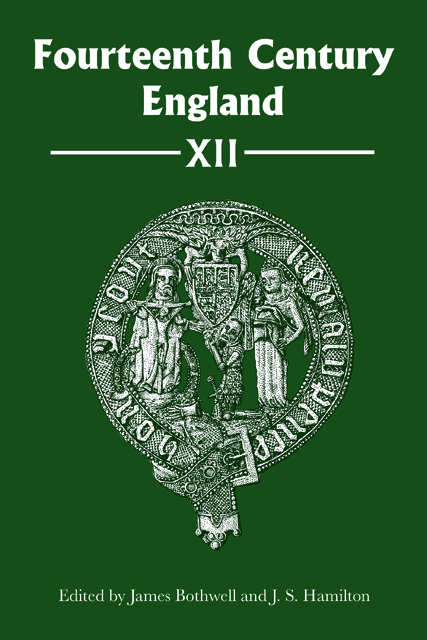Book contents
- Frontmatter
- Contents
- List of Illustrations
- List of Contributors
- Preface
- Abbreviations
- The King’s Confessors and the Royal Conscience in Late Medieval England
- ‘Such maintenance as …’: Corrodies of the Crown
- ‘Vos maisons sount pris al eops le counte’: Walter Bedwyn, Treasurer of York, and the Return of Piers Gaveston
- The Deposition of Edward II: The Kenilworth Embassies
- The English Parliament and the Trial of the ‘Peers of the Land’ in Henry of Lancaster’s Revolt (1328–29): The Origins of a Privilege
- A Brotherhood Uncovered: Investigating the Knightly Following of Thomas Beauchamp, earl of Warwick, 1329–69
- The Black Death and Clerical Prospects in England
- The Last of the Duketti? Richard II, Henry of Monmouth and the House of Lancaster
- Confusion Confounded? The Contrasting Military Fortunes of Sir William Neville (d. c.1391) and Sir William Neville of Pickhill and Rolleston (d. c.1420)
The King’s Confessors and the Royal Conscience in Late Medieval England
Published online by Cambridge University Press: 11 January 2023
- Frontmatter
- Contents
- List of Illustrations
- List of Contributors
- Preface
- Abbreviations
- The King’s Confessors and the Royal Conscience in Late Medieval England
- ‘Such maintenance as …’: Corrodies of the Crown
- ‘Vos maisons sount pris al eops le counte’: Walter Bedwyn, Treasurer of York, and the Return of Piers Gaveston
- The Deposition of Edward II: The Kenilworth Embassies
- The English Parliament and the Trial of the ‘Peers of the Land’ in Henry of Lancaster’s Revolt (1328–29): The Origins of a Privilege
- A Brotherhood Uncovered: Investigating the Knightly Following of Thomas Beauchamp, earl of Warwick, 1329–69
- The Black Death and Clerical Prospects in England
- The Last of the Duketti? Richard II, Henry of Monmouth and the House of Lancaster
- Confusion Confounded? The Contrasting Military Fortunes of Sir William Neville (d. c.1391) and Sir William Neville of Pickhill and Rolleston (d. c.1420)
Summary
By the time John de Warenne, eighth earl of Surrey in a line stretching back to the eleventh century, died on 29 June 1347, the inheritance of his great estates had been under discussion for over twenty years. With no legitimate heirs of his body, long estranged from his wife, his hopes of extending his lineage rested upon King Edward III accepting as his heir one of his bastards, who might then be legitimized. By the spring of 1346, when he was in his sixtieth year and a sick man, he had eventually persuaded the king to do this, although not without consenting to a deal whereby most of the lands were likely before long to pass to the crown. To the earl of Arundel, however, who was Warenne’s nephew and collateral heir, this was anathema, since it dashed his expectation of succeeding to an inheritance which would almost double his landed income. On 7 July 1346, therefore, as Warenne lay on his sickbed and Edward III’s fleet lay at anchor off Yarmouth (Isle of Wight) preparing to invade France, Arundel approached the king to protest at his ‘disherison’. For the moment, Edward prevaricated, but on 20 November he drew up an instrument in which, after reciting his earlier grant, he announced that now, ‘having revolved the aforesaid matters in the court of our conscience (in foro nostre conscientie premissis revolutis)’, he had changed his mind and reinstated Arundel as the heir. The internal scrutiny which elicited this decision was evidently a point that required emphasis, for three weeks later, when he confirmed his decision, he twice reiterated that the exclusion of Arundel from his inheritance would have done ‘violence to the king’s good faith and conscience’. Thus it was that when Warenne died six months later, Arundel duly succeeded to his lands in Surrey, Sussex and the March of Wales.
Needless to say, it was not as simple as that. If the prick of conscience was how Edward chose to present his decision, he added that it was also ‘in consideration of the service of the petitioner [Arundel] in the war of France’ – especially, presumably, Arundel’s presence at the battle of Crécy on 26 August, where he commanded a division. Moreover, there was a price to pay, for in return Arundel agreed to the detachment of around a quarter of the Warenne inheritance, most of which later contributed to an apanage for Edward’s fourth son, Edmund of Langley.
- Type
- Chapter
- Information
- Fourteenth Century England XII , pp. 1 - 28Publisher: Boydell & BrewerPrint publication year: 2022

